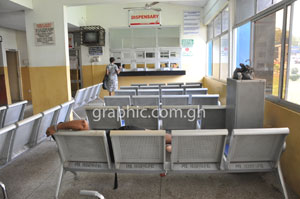Empty hospital pharmacies
 It has been months since pharmacists working in the public sector decided to embark on an industrial action to demand their fair share of the national cake. At the time that they decided to do so, medical officers employed by the state were also on strike.
It has been months since pharmacists working in the public sector decided to embark on an industrial action to demand their fair share of the national cake. At the time that they decided to do so, medical officers employed by the state were also on strike.
Advertisement
However, the ire and sympathy of the public focused on the medical officers and since the doctors resumed work, nothing has been heard about the pharmacists.
Obviously, the pharmaceutical industry, particularly the operation of pharmacies and chemical shops, has been dominated by the private sector and, therefore, the action embarked upon by the pharmacists in state employment has not had the mass dysfunctional effect on patients as was the case with the medical officers.
Accordingly, both the pharmacists and the government have not attracted the wrath of Ghanaians as happened with the medical officers.
However, for those on admission in big public hospitals and their relatives, they are going through harrowing experiences, as they have to traverse many pharmacy shops close by and far from the hospitals before they are able to get supplies to prescriptions. The inconvenience of moving into overcrowded pharmacies and joining queues only to be told at the end that your prescribed drugs are not available is no easy thing.
And when you get the drugs, the prices are far beyond the means of the average person, and in some instances, the price disparities are so wild that one is left wondering how the prices are determined. Sometimes, the explanation is that it is because of the source of manufacture or country of origin. But, how is it that a certain drug could cost more than double at pharmacies adjacent or opposite each other.
The musician said it right, that obiara ennye obi, meaning we are all not equal. How true that Ghanaians have kept silent all this while that state employed pharmacists have been on strike and we are neither appealing to the pharmacists nor chastising the government through the Fair Wages and Salaries Commission (FWSC)?
And how is it that the National Labour Commission has not applied the same yardstick as it did with the doctors in taking them to court as a way of compelling them to return to work?
A number of patients and relatives interviewed at the Korle Bu Teaching Hospital could not understand why the pharmacists could be on strike for all this while without the government issuing any statement, as it did in the case of the medical officers, to either state its case or denounce the pharmacists.
They maintained that whereas visiting hours are limited, taking prescription outside for drugs cannot be a normal situation and they therefore want both the pharmacists and government to take steps to resolve their differences so that the pharmacies at our hospitals would re-open to serve the interest of patients.
One relative pointed out how he had to move from Korle Bu to the 37 Military Hospital, the Trust Hospital and Pharmacy Shops along the Osu Oxford Street in search of a feeding tube for a patient who could not do anything and had to be given medication via the tube through the nose.
He pointed out that such items were better stocked in government pharmacies rather than in private pharmacy shops. Beyond that, if the Korle Bu Pharmacy is open, it does not take long to return with the drugs. However, with the private pharmacies, you have to step outside the hospital.
The impasse between the pharmacists and the government represented by the (FWSC) cannot be allowed to continue without dialogue. The pharmacists have been ignored at the peril of patients and the time has come for a solution to be found.
In that wise, I would like to appeal to the pharmacists that just as the medical officers gave consideration to the public interest and returned to work, only to be told by the FWSC that they were not entitled to any convergence difference, they may return to serve the patients who appreciated their invaluable contribution to the healthcare delivery system
If doctors had not unilaterally considered the public interest, we would still have been suffering and recording fatalities because even the legal action brought against them by the National Labour Commission could had protracted the crisis, since the law moved slowly, steadily, methodically and ensured that all parties should have a fair hearing.
The FWSC does not seem to appreciate the cost of the closure of the hospital pharmacies to patients. The pharmacists themselves must opt for the public interest so that we can all support them in their fight with the FWSC for their fair share of the national cake.
FWSC does not seem to appreciate the cost of the closure of the hospital pharmacies to patients. The pharmacists themselves must opt for the public interest so that we can all support them in their fight with the FWSC for their fair share of the national cake.
Article by Yaw Boadu-Ayeboafoh




